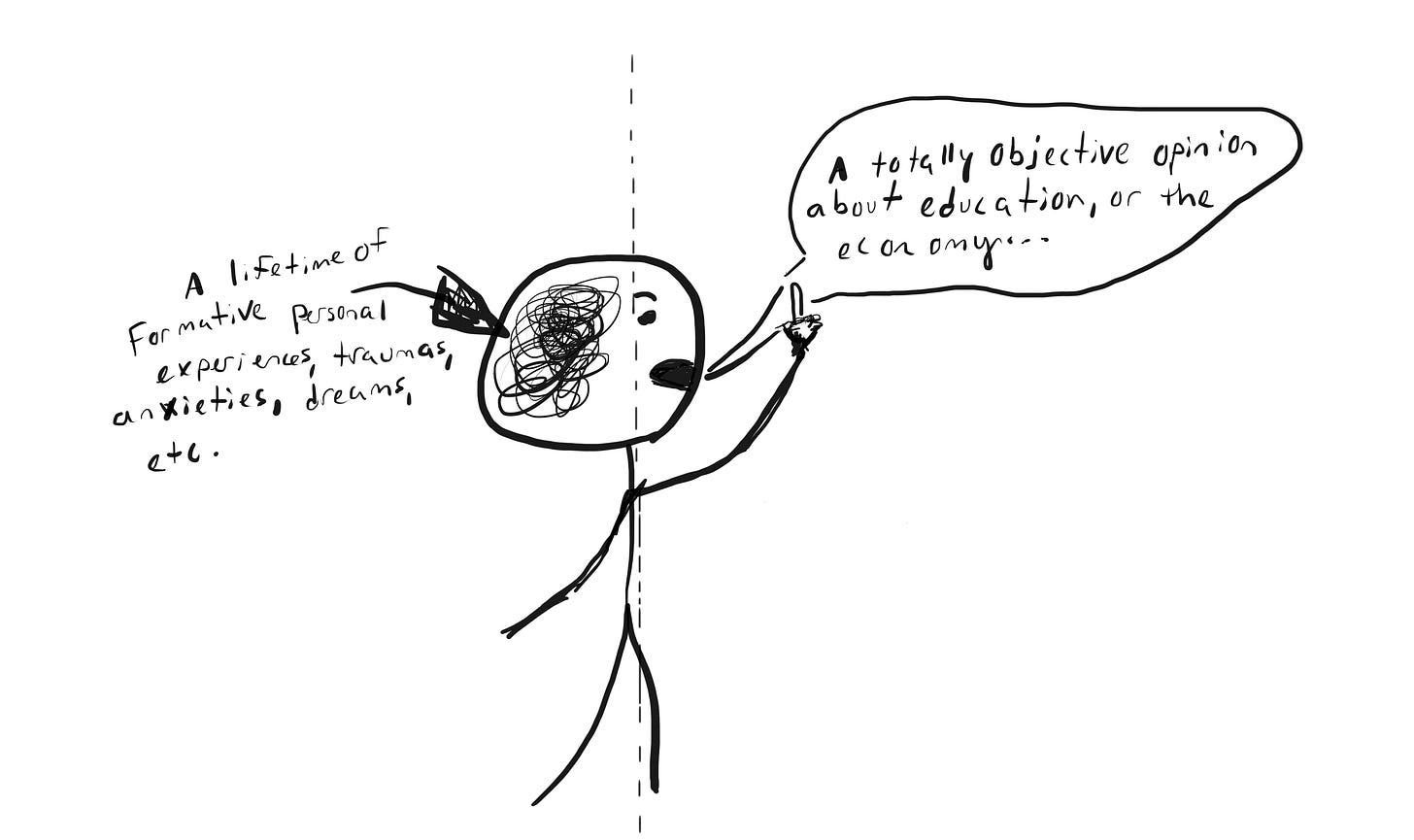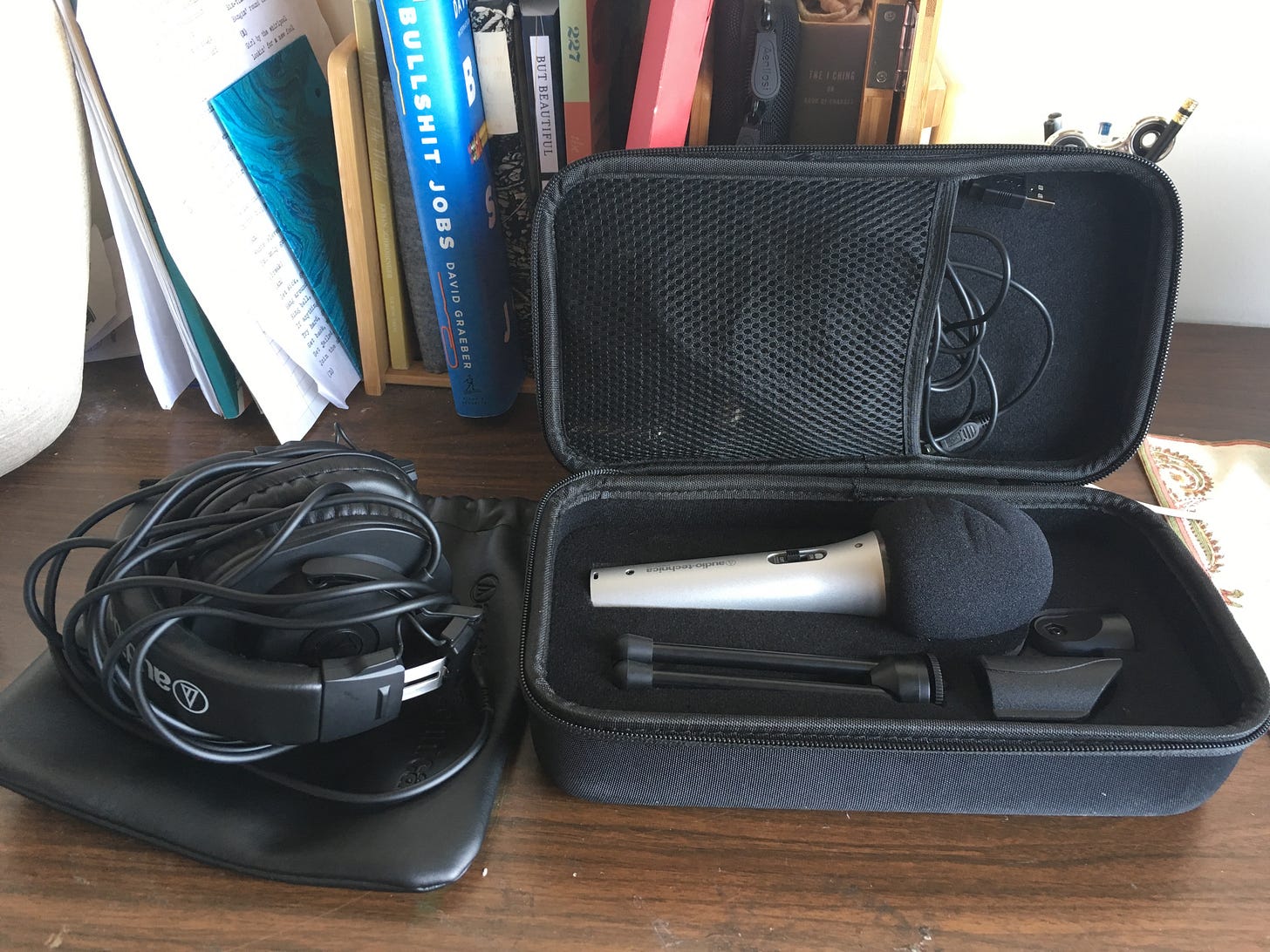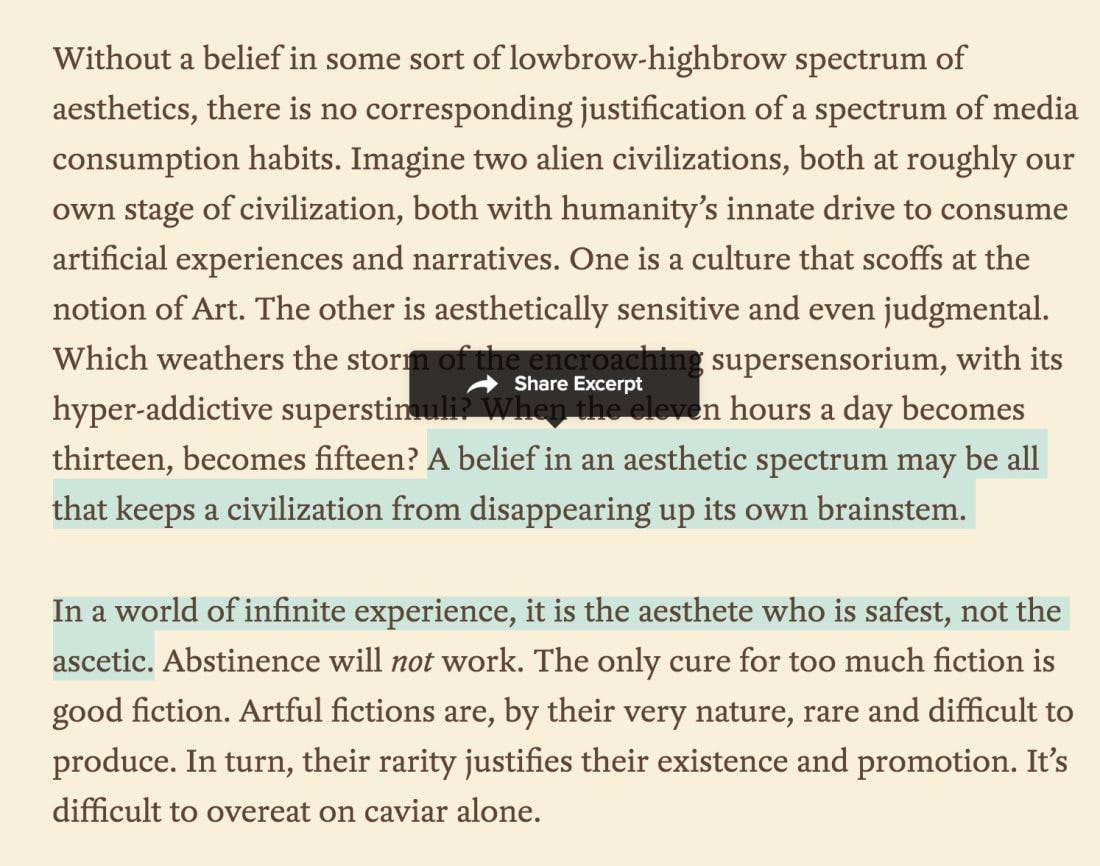Hello fellow humans -
I have some exciting (and nerve-racking) news. I’m starting a podcast. More on that below.
I wrote a new essay - Cultural Critique as Self-Inquiry - exploring how what we usually consider ‘objective’ often has roots in subjective experience, and how building cultural systems - like economics, or tech - with the fetishization of the objective winds up impoverishing our subjectivity, or what it feels like to exist. It also has my best stick-figure drawing to date.
I found a video of Daniel Schmactenberger giving a 20-min talk that blew me out of my fucking skin (I’m still wandering the routines of my life as some kind of dazed & de-skinned mutant).
Zak Stein offering a definition for meta-modernism.
Let’s dig in.
New Essay - Cultural Critique as Self-Inquiry
This one turned into kind of a doozy, but it’s all one big unpacking of my stick figure drawing:

I think we’ve been operating on this model of cultural discourse, where we amputate subjective experience from ‘objective’ opinions.
The problem is that I don’t think this is possible. I’m not sure any cultural critique, any discourse about the economy or technology, doesn’t have roots extending into the formative personal experience of that individual.
So all we’re really doing is repressing subjective experience and cherry-picking information from the eyeballs outward, ignoring the interior stuff.
Which is why we find ourselves in a cultural environment that not only neglects, but deteriorates the very interior experience of human beings within it.
In a section on technology, I wrote:
“The late 20th century emergence of “Human-Centered Design” (HCD) in the technological sphere indicates a similar disregard of subjectivity from technological discourse.
The most startling aspect of HCD is its implication that we’d previously forgotten the human altogether.
Wikipedia writes of HCD: “Human-centered design is a design and management framework that develops solutions to problems by involving the human perspective in all steps of the problem-solving process.” Prior to HCD, what perspective were we involving if not the human? After an explosion of technology design evaluated solely in its objective dimensions, we’re finding that we don’t like the variety of humans it’s turning us into.”
“Involving the human perspective” (though I’d like to extend this to all sentient perspectives) is a nice way to think about cultural change for the 21st century at large. Reimagining cultural institutions and our built environment to nourish how they interface with consciousness, with the interior experience of being alive.
Ursula K. Le Guin calls this “subjectifying the universe”:
“I guess I’m trying to subjectify the universe, because look where objectifying it has gotten us. To subjectify is not necessarily to co-opt, colonize, exploit. Rather it may involve a great reach outward of the mind and imagination.”
Anyway, check out the full essay here:
Some Exciting/Nerve-Racking News
Well, it looks like I’m joining the rest of our entire fucking generation in starting a podcast. I’m doing so for a few reasons.
I want to make conversation a more central part of my thinking life. Conversation is itself a creative, introspective practice that I don’t get enough of.
I do a lot of solitary thinking & dancing with ideas, but being on the spot, in a spontaneous and unscripted dialogue has a way of leading you to say things you couldn’t have planned. And things are more fun with other people.I’m still having trouble finding the conversations I want to hear. I’m not interested in consciousness & culture as separate inquiries, but as aspects of the same dialogue. I’m also not interested in just asking one question and letting the guest speak uninterruptedly for an hour. I want real, back-and-forth conversations. To challenge people to go beyond what they’ve prepared to say, and enter that space of unknowing where conversations grow rich and surprising.
I’m still in the planning stage, but I’m stuck on the name. Thought I’d reach out to you all, as folks somewhat familiar with what I’m doing here, and with marketing and personal experience beyond what I have. There are 3 options for the podcast name (so far):
The Prudence Project (Conversations about consciousness & culture)
Mind Matters Podcast (Conversations about consciousness & culture)
Musing Mind Podcast (Conversations about consciousness & culture)
The Prudence Project
I always figured this would be the name, but then realized things are getting complicated. I have my website, musingmind.org, the newsletter, Mind Matters Newsletter, and then a podcast, with a totally different name, The Prudence Project?
I’m worried that having 3 separate entities, all unrecognizable from each other as far as the names go, is a bad move. The question is, how bad? Alternatively, maybe it’s good…?
Mind Matters Podcast
This would just house the podcast and newsletter under the same name, which is probably good in terms of increasing visibility and familiarity with people across the internet. But they are separate projects, so..
Musing Mind Podcast
Same as above, housing the podcast under the website name. I don’t like “Musing Mind”, I’ve always thought it a bit weird but am too deep in to change it, so I don’t love the idea of doubling down on that.
If you have any relevant experience, or just a strong personal feeling/reaction, please reply or reach out here and let me know, I would appreciate any/all feedback.

(Crazy how little is needed for a podcast - that’s all my equipment, minus software.)
Daniel Schmachtenberger’s Dharma Talk
I’m new to Schmachtenberger’s work (his podcast series with Future Thinkers is really, absurdly fascinating), and found this talk moving in its vibe and thrilling in its scope & synthesis:
Towards the end, he describes “3 phase shifts” - at the levels of social systems, infrastructure, and memetic or superstructure - that we’re now sitting upon the brink of.
The Social System Phase Shift
“At the level of social systems, primarily economics, the key shift…is a moving from a differential advantage economy, defined by private ownership, valuation based in scarcity, and differential advantage, to an economic system that is defined by making sure that the incentive of every agent and the wellbeing of every other agent in the commons is perfectly aligned with no externality. Meaning that we actually understand it’s an interconnected system, we identify all the externalities and internalize them, so the system’s actually defined by systemic advantage for the whole. This is not communism, or socialism, or capitalism, it’s something that was not possible before…but it is how your body works. Where none of the cells are advantaging themselves at the expense of the other. They’re doing what’s best for them, what’s best for the whole symbiotically at the same time.”
The Infrastructure/Built-World Shift
“…At the level of infrastructure and the built world, we’re moving from a linear materials economy, where we extract from the earth at ever-growing rates unsustainably from finite resources and turn them into trash, to a closed-loop materials economy where the trash is the new stuff, we stop extracting from the earth, stop producing waste, and we actually have a post-growth, negative entropy, closed-loop materials economy, where we can live ongoingly at progressively higher and higher quality of life sustainably with the biosphere…”
The Memetic or Superstructure shift
“The superstructure, the memetic shift, is this awareness of all of us as facets of one integrated self-evolving reality, where the wellbeing of everyone, the wellbeing of the commons, are not meaningfully calculable separate from each other.”
Little bit more elaboration on the Tweeter:


Zak Stein on Metamodernism
Zak Stein seems to be in the same camp as Schmachtenberger. Integral thinkers who seem to be familiar with almost every domain of human knowledge, and are articulating their own creative syntheses of that broad insight.
Feels like they’re on the front edge of cultural inquiry.
Metamodernism
This word is being thrown around a lot lately, and as I’ve unfortunately begun using it, I think a little primer on what it means, or at least what I mean by it, might be helpful.
Metamodernism is the third in a line of three distinct ways of thinking about the human situation:
Modernism (19th-20th cenutry) -> Post-Modernism (late 20th century) -> Meta-Modernism (now)
Modernism: new and pretty radical forms of self-expression (James Joyce’s stream of consciousness writing, or T.S. Eliot poetry), an optimistic belief in progress and grand narratives.
Post-Modernism: Nah, everything is relative, progress doesn’t exist beyond arbitrary context, there is no truth. An ironic skepticism towards any grand narrative.
Meta-Modernism: ?? This is where Zak Stein offered the most coherent definition I’ve encountered. Describing a meta-modern perspective, he says on a podcast:
“We can make judicious decisions about which views are most reasonable, and eventually get a kind of catalogue of the viability of different views. And so one of the things that characterizes the move beyond Post Modernism is a reemergence of hierarchy, and evaluative distinction, and the reemergence of objectivity. But not the simplistic, modern objectivity. An objectivity that has to do with the refraction of different perspectives.”
Meta-modernism accepts the postmodern deconstruction of any single narrative that claims absolute truth, but it also suggests we don’t have to remain in the everything-is-relative-nothing-actually-matters puddle that creates. It suggests the “reemergence of hierarchy”, and establishing that hierarchy occurs by fluidity across as many different perspectives as possible.
This rung a bell - taking Zak’s definition in conjunction with Erik Hoel’s recent essay on the Supersensorium - which I wrote about in a previous newsletter - creates an interesting resonance.
The basic idea across both nuggets is that it’s important for us to figure out a way to judge certain things as being ‘better’ than other things. Without this evaluative distinction, what Hoel calls “a belief in an aesthetic spectrum”, we will, as Hoel cautions, disappear up our own brainstem. That is, be consumed by the impoverished hedonism that thrives in an everything-is-relative vacuum.

That’s it!
As always, feel free to reach out for any reason, or check out the full (redesigned!) website: www.MusingMind.org.
If you find any value here, feel free to support me by sharing the newsletter link - musingmind.substack.com - with friends (or strangers on the internet ¯\_(ツ)_/¯)
Onwards,
Oshan